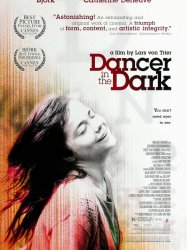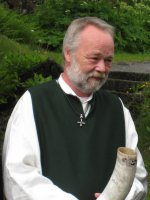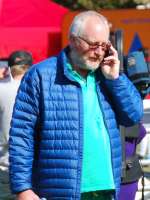Friðrik Þór Friðriksson is a Actor, Director, Scriptwriter and Producer Islandais born on 12 may 1954 at Reykjavík (Islande)
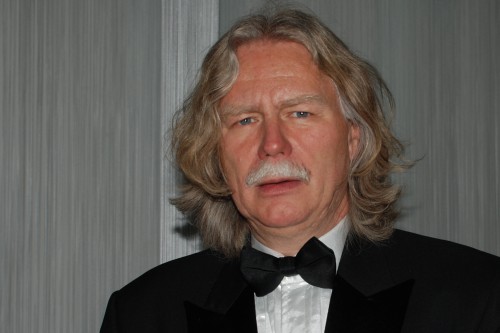
Friðrik Þór Friðriksson (born May 12, 1954; pronounced [ˈfrɪðrɪk ˈθouːr ˈfrɪðrɪxsɔn]), sometimes credited as Fridrik Thor Fridriksson, is an Icelandic film director.
He started his film making career with experimental films and documentaries in the early 1980s. He founded The Icelandic Film Corporation in 1990, it has since become Iceland's most important film production company. The company produces his films and works with other Icelandic directors as well as producers. His international reputation led the company to build a network of internationally well-established co-production partner companies, including Lars von Trier's Zentropa and most recently, Francis Ford Coppola's American Zoetrope. His second feature Children of Nature (1991) was nominated for an Oscar as Best Foreign Language Film and it took the Grand Prize at the 4th Yubari International Fantastic Film Festival in February 1993.
Friðrik also starred in Lars von Trier's 2006 comedy film The Boss of it All.
He grew up in Iceland in the sixties and so was largely influenced by American films. Despite that it was exposure to the work of Akira Kurosawa, John Ford and Nicholas Ray which proved crucial in his decision to become a filmmaker. He has worked with two of Iceland's most acclaimed novelists and script-writers. His work with Einar Már Guðmundsson includes Children Of Nature, Angels of the Universe, and Moviedays. His work with Einar Kárason includes White Whales, Devils Island, and Falcons Friðrik Þór Friðriksson is noted for the strong visual style of his films including stunning images. These films are both deeply personal and strongly rooted in Icelandic culture, often depict characters at the crossroads of tradition and modernity. They are said to combine a wry sense of humour with a genuine solidarity with the characters.
His newest work includes the documentary A Mother's Courage: Talking Back to Autism, locally named the Sunshine Boy, premiered at the Toronto film festival 2009, and his latest feature film Mamma Gógó, now pre-selected for candidature for European film awards.
Mother Courage has been nominated for the Voice award 2010.
Il fonde en 1987 l'Icelandic Film Corporation qui est très vite devenu la plus importante structure cinématographique en Islande, produisant ou coproduisant la majorité des films nationaux. La réputation grandissante de la société lui a permis d'édifier un imposant réseau de partenaires, comportant entre autres Zentropa de Lars von Trier ou American Zoetrope de Francis Ford Coppola. Cette reconnaissance l'a amené à coproduire des films comme Dancer in the Dark ou No Such Thing de Hal Hartley.
En tant que réalisateur, il rencontre l'approbation critique internationale grâce à son deuxième long-métrage Les Enfants de la nature (1991), nommé à l'Oscar du meilleur film en langue étrangère et contant l'échappée belle de deux retraités sur les routes islandaises.
Il joue également dans Plan B de Jóhann Sigmarsson en 2000 et dans Le Direktør de Lars von Trier en 2006.
Friðrik Þór Friðriksson a été influencé par le cinéma commercial américain distribué en Islande durant son enfance mais c'est la découverte d'Akira Kurosawa qui a tenu une importance cruciale dans son évolution artistique. Ses films cultivent deux paradoxes : tout à la fois ironiques et tendres, ils sont également profondément personnels malgré un fort enracinement dans la culture islandaise. Ses personnages sont ainsi au croisement de la modernité et de la tradition, une caractérisation qui semble trouver écho au sein du public islandais puisque Les Anges de l'univers, sorti en 2000, a été vu en salles par plus de la moitié de la population du pays.
Après dix ans de retrait, il sort un nouveau film, Mamma Gógó, en 2010.
Source : Wikidata
Friðrik Þór Friðriksson

- Infos
- Photos
- Best films
- Family
- Characters
- Awards
He started his film making career with experimental films and documentaries in the early 1980s. He founded The Icelandic Film Corporation in 1990, it has since become Iceland's most important film production company. The company produces his films and works with other Icelandic directors as well as producers. His international reputation led the company to build a network of internationally well-established co-production partner companies, including Lars von Trier's Zentropa and most recently, Francis Ford Coppola's American Zoetrope. His second feature Children of Nature (1991) was nominated for an Oscar as Best Foreign Language Film and it took the Grand Prize at the 4th Yubari International Fantastic Film Festival in February 1993.
Friðrik also starred in Lars von Trier's 2006 comedy film The Boss of it All.
He grew up in Iceland in the sixties and so was largely influenced by American films. Despite that it was exposure to the work of Akira Kurosawa, John Ford and Nicholas Ray which proved crucial in his decision to become a filmmaker. He has worked with two of Iceland's most acclaimed novelists and script-writers. His work with Einar Már Guðmundsson includes Children Of Nature, Angels of the Universe, and Moviedays. His work with Einar Kárason includes White Whales, Devils Island, and Falcons Friðrik Þór Friðriksson is noted for the strong visual style of his films including stunning images. These films are both deeply personal and strongly rooted in Icelandic culture, often depict characters at the crossroads of tradition and modernity. They are said to combine a wry sense of humour with a genuine solidarity with the characters.
His newest work includes the documentary A Mother's Courage: Talking Back to Autism, locally named the Sunshine Boy, premiered at the Toronto film festival 2009, and his latest feature film Mamma Gógó, now pre-selected for candidature for European film awards.
Mother Courage has been nominated for the Voice award 2010.
Biography
Friðrik Þór Friðriksson se fait remarquer au début des années 1980 avec quelques films expérimentaux et des documentaires brossant le portrait de personnages charismatiques (un vieil artisan isolé au fin fond de la côte est islandaise dans The Blacksmith) ou dévoilant la scène musicale effervescente de la capitale (Rock in Reykjavik).Il fonde en 1987 l'Icelandic Film Corporation qui est très vite devenu la plus importante structure cinématographique en Islande, produisant ou coproduisant la majorité des films nationaux. La réputation grandissante de la société lui a permis d'édifier un imposant réseau de partenaires, comportant entre autres Zentropa de Lars von Trier ou American Zoetrope de Francis Ford Coppola. Cette reconnaissance l'a amené à coproduire des films comme Dancer in the Dark ou No Such Thing de Hal Hartley.
En tant que réalisateur, il rencontre l'approbation critique internationale grâce à son deuxième long-métrage Les Enfants de la nature (1991), nommé à l'Oscar du meilleur film en langue étrangère et contant l'échappée belle de deux retraités sur les routes islandaises.
Il joue également dans Plan B de Jóhann Sigmarsson en 2000 et dans Le Direktør de Lars von Trier en 2006.
Friðrik Þór Friðriksson a été influencé par le cinéma commercial américain distribué en Islande durant son enfance mais c'est la découverte d'Akira Kurosawa qui a tenu une importance cruciale dans son évolution artistique. Ses films cultivent deux paradoxes : tout à la fois ironiques et tendres, ils sont également profondément personnels malgré un fort enracinement dans la culture islandaise. Ses personnages sont ainsi au croisement de la modernité et de la tradition, une caractérisation qui semble trouver écho au sein du public islandais puisque Les Anges de l'univers, sorti en 2000, a été vu en salles par plus de la moitié de la population du pays.
Après dix ans de retrait, il sort un nouveau film, Mamma Gógó, en 2010.
Best films
Usually with
Filmography of Friðrik Þór Friðriksson (22 films)
Actor
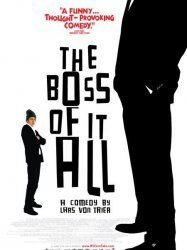
The Boss of It All (2006)
, 1h39Directed by Lars von Trier
Origin Danemark
Genres Drama, Comedy
Themes Films about the labor movement
Actors Jens Albinus, Friðrik Þór Friðriksson, Jean-Marc Barr, Peter Gantzler, Casper Christensen, Benedikt Erlingsson
Roles Finnur
Rating65%





The owner of an IT company wishes to sell it. But, for years, he has pretended that the real boss lives in America and communicates with the staff only by e-mail. That way, all the unpopular decisions can be attributed to the absentee manager, while all the popular ones to him directly. But now, the prospective buyer insists on meeting the big boss in person. In a panic, the owner hires a failed, over-intellectualizing actor to portray this imaginary boss, and the actor proceeds to improvise all his lines, to the consternation of both the buyer and the company staff, who finally get to meet their ghostly boss.
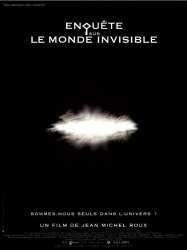 , 1h27
, 1h27Directed by Jean-Michel Roux
Genres Documentary
Actors Friðrik Þór Friðriksson, Baltasar Kormákur
Rating69%





Vivant au milieu d’une nature primitive toujours en formation, la société islandaise entretient des rapports secrets avec une communauté d’êtres invisibles : les elfes.

Children of Nature (1991)
, 1h22Directed by Friðrik Þór Friðriksson
Origin Islande
Genres Drama, Romance
Actors Gísli Halldórsson, Bruno Ganz, Tinna Gunnlaugsdóttir, Friðrik Þór Friðriksson
Roles Taxi Driver
Rating71%





A man becomes too old to run his farm and he is made unwelcome in his daughter and son-in-law's urban dwelling. Dumped in a home for the elderly, he meets an old girlfriend from his youth, and they elope to the wilds of Iceland to die together.
Director
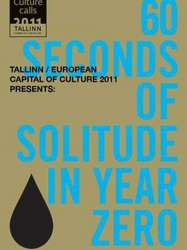 , 1h
, 1hDirected by Friðrik Þór Friðriksson, Michael Winterbottom, Michael Glawogger, Brillante Mendoza, Brian Yuzna, Albert Serra, Ken Jacobs, Aki Kaurismäki, Shinji Aoyama, Eric Khoo, Park Chan-wook, Pen-ek Ratanaruang, Naomi Kawase, Adam Wingard, Auraeus Solito, Tom Tykwer, Amir Naderi, Gakuryū Ishii, Vimukthi Jayasundara, Simon Rumley, Jeon Kyu-hwan, Rafi Pitts, Edmund Yeo, Mika Taanila, Dalparan, Aku Louhimies, Tolga Karaçelik
Genres Drama, Thriller, Comedy, Documentary, Horror, Animation
Rating57%





 , 1h26
, 1h26Directed by Friðrik Þór Friðriksson
Genres Drama
Actors Martin Compston, Gary Lewis, Peter Capaldi, Shauna Macdonald, Kerry Fox, Guðrún Gísladóttir
Rating62%





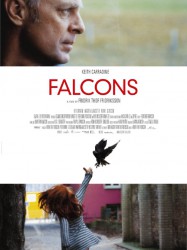
Falcons (2002)
, 1h35Directed by Friðrik Þór Friðriksson
Genres Drama
Actors Keith Carradine, Ingvar E. Sigurðsson, Axel Prahl, Hark Bohm
Rating58%





It is the story of an ex con, Simon (Carradine) who after returning to Iceland, where his mother was born visit relatives, looks for the loneliest place in the world to commit suicide. In a small village he met Dúa (Vilhjálmsdóttir), an Icelandic young lady, who is found to be an interesting, rather strange woman by Simon. Dúa has a caged falcon that she hopes to tame, but they get into trouble as it is illegal to possess this kind of animal in captivity.

Angels of the Universe (2000)
, 1h40Directed by Friðrik Þór Friðriksson
Origin Islande
Genres Drama
Themes Medical-themed films, Psychologie, Films about psychiatry, Films set in psychiatric hospitals
Actors Ingvar E. Sigurðsson, Baltasar Kormákur
Rating73%





Englar Alheimsins, which has often been called an Icelandic One Flew Over the Cuckoo's Nest, is the story of an Icelandic man named Páll (Ingvar E. Sigurðsson). After his girlfriend leaves him he's slowly turning into a state of madness and depression. His parents decide to send him to a mental hospital where he meets Óli (Baltasar Kormákur), who believes he's the songwriter for The Beatles, Viktor (Björn Jörundur Friðbjörnsson), who signs cheques with the signature of Adolf Hitler, and other special characters. The movie depicts his struggle, in and out of the mental hospital.

Devil's Island (1996)
, 1h39Directed by Friðrik Þór Friðriksson
Genres Drama, Comedy
Actors Gísli Halldórsson, Baltasar Kormákur, Ingvar E. Sigurðsson
Rating71%





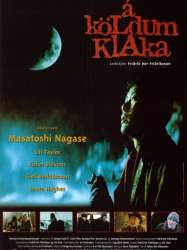
Cold Fever (1995)
, 1h25Directed by Friðrik Þór Friðriksson
Origin Islande
Genres Drama, Comedy
Themes Transport films, Films about automobiles, Road movies
Actors Masatoshi Nagase, Lili Taylor, Fisher Stevens, Seijun Suzuki, Gísli Halldórsson
Rating69%





Hirata (Masatoshi Nagase) is a successful Japanese businessman whose plan for a two-week winter holiday in Hawaii to play golf changes when his elderly grandfather (Seijun Suzuki) reminds him that he should go to Iceland.

Movie Days (1994)
, 1h22Directed by Friðrik Þór Friðriksson
Genres Drama
Actors Otto Sander, Sigurður Sigurjónsson, Edda Heiðrún Backman
Rating64%






Children of Nature (1991)
, 1h22Directed by Friðrik Þór Friðriksson
Origin Islande
Genres Drama, Romance
Actors Gísli Halldórsson, Bruno Ganz, Tinna Gunnlaugsdóttir, Friðrik Þór Friðriksson
Rating71%





A man becomes too old to run his farm and he is made unwelcome in his daughter and son-in-law's urban dwelling. Dumped in a home for the elderly, he meets an old girlfriend from his youth, and they elope to the wilds of Iceland to die together.
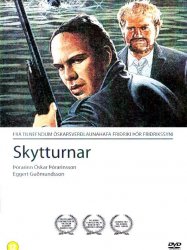
White Whales (1987)
, 1h20Directed by Friðrik Þór Friðriksson
Genres Drama
Rating61%





The story starts when two experienced whalers decided to settle down in Reykjavík at the end of the whaling season. While there, they get into trouble and are thrown out of one establishment after another. When events escalated to violence, they break into a weapons shop and steal rifles to confront the police.

Rock in Reykjavik (1982)
, 1h23Directed by Friðrik Þór Friðriksson
Genres Documentary, Musical
Actors Björk
Rating71%





 Connection
Connection
